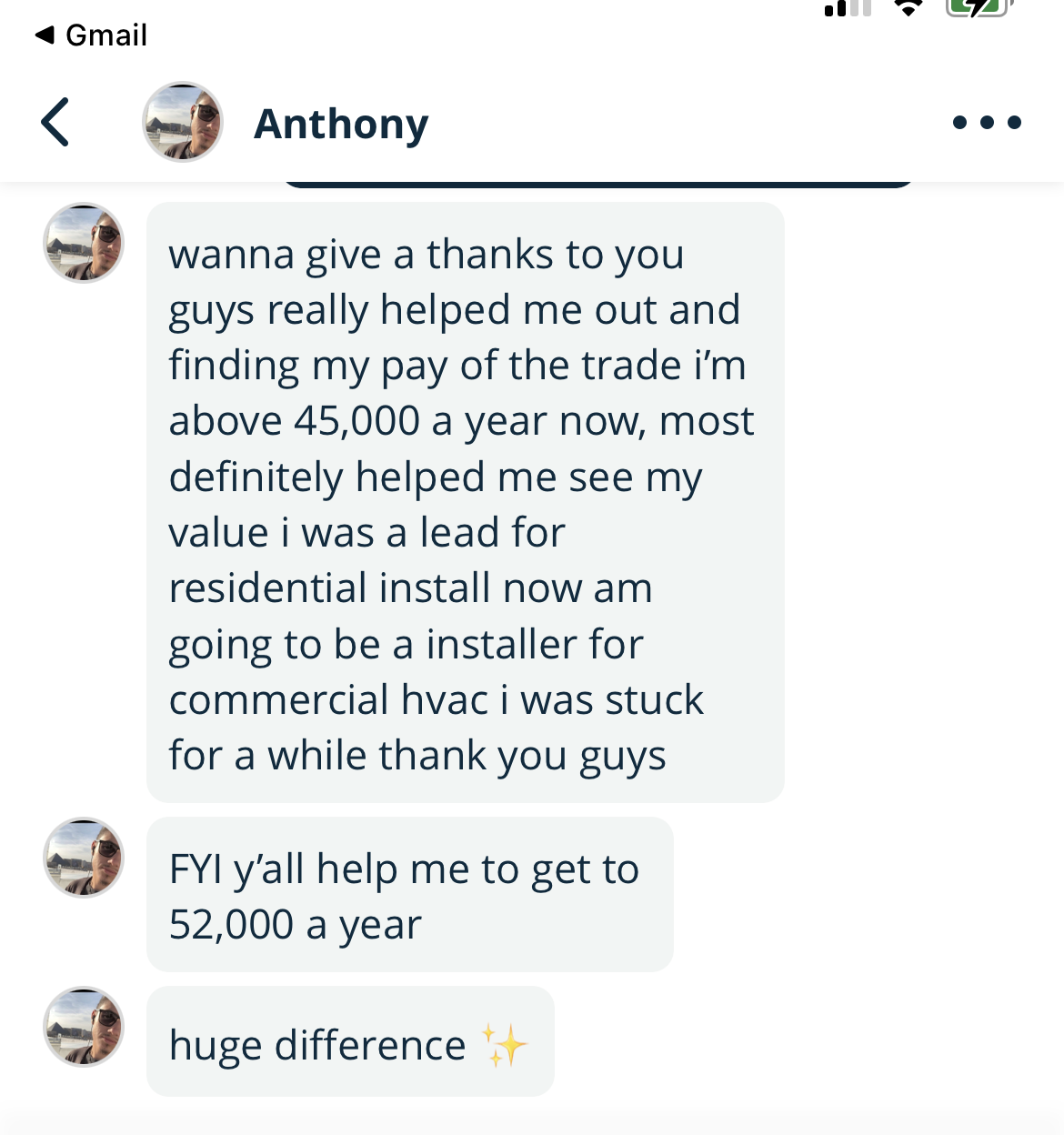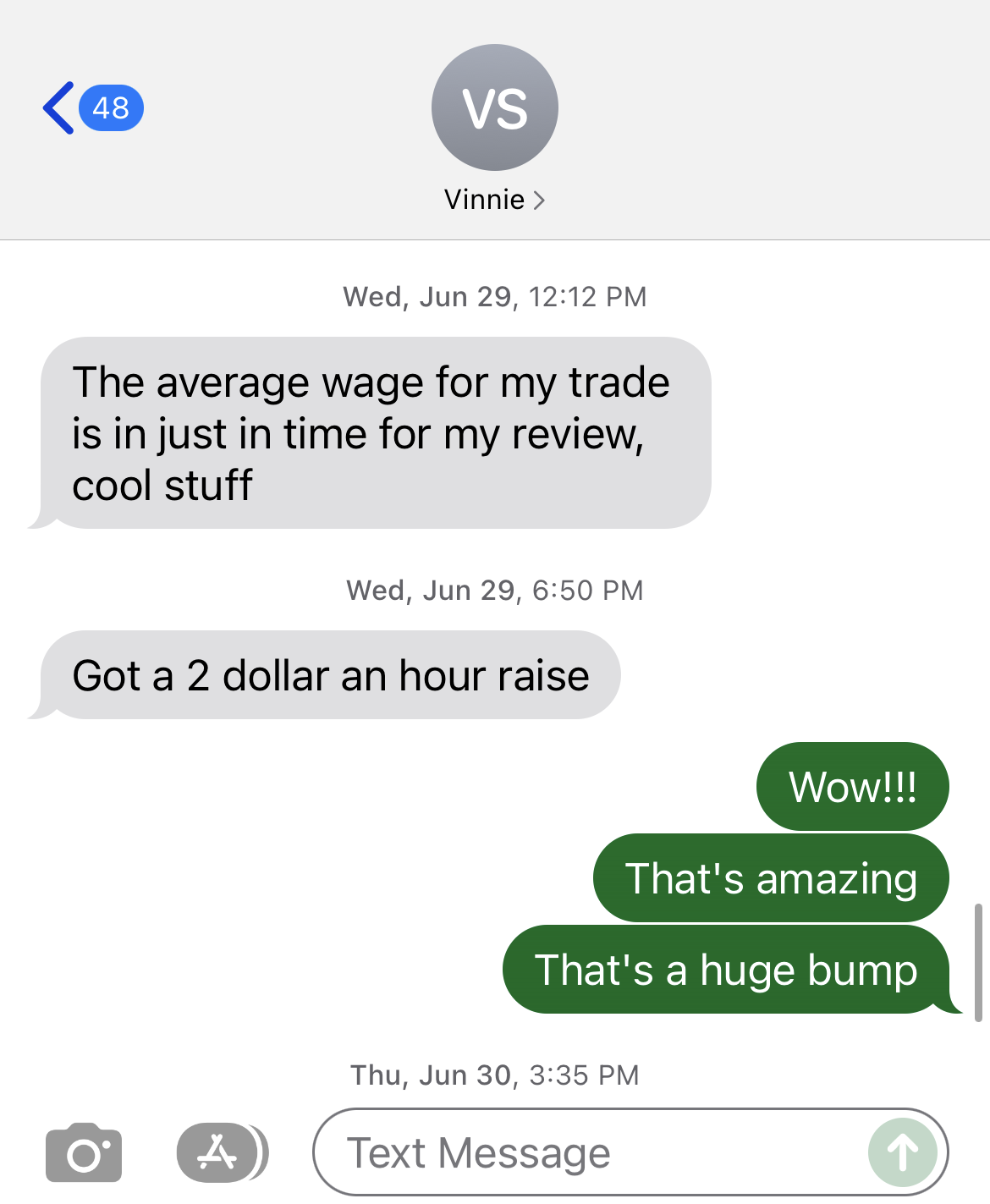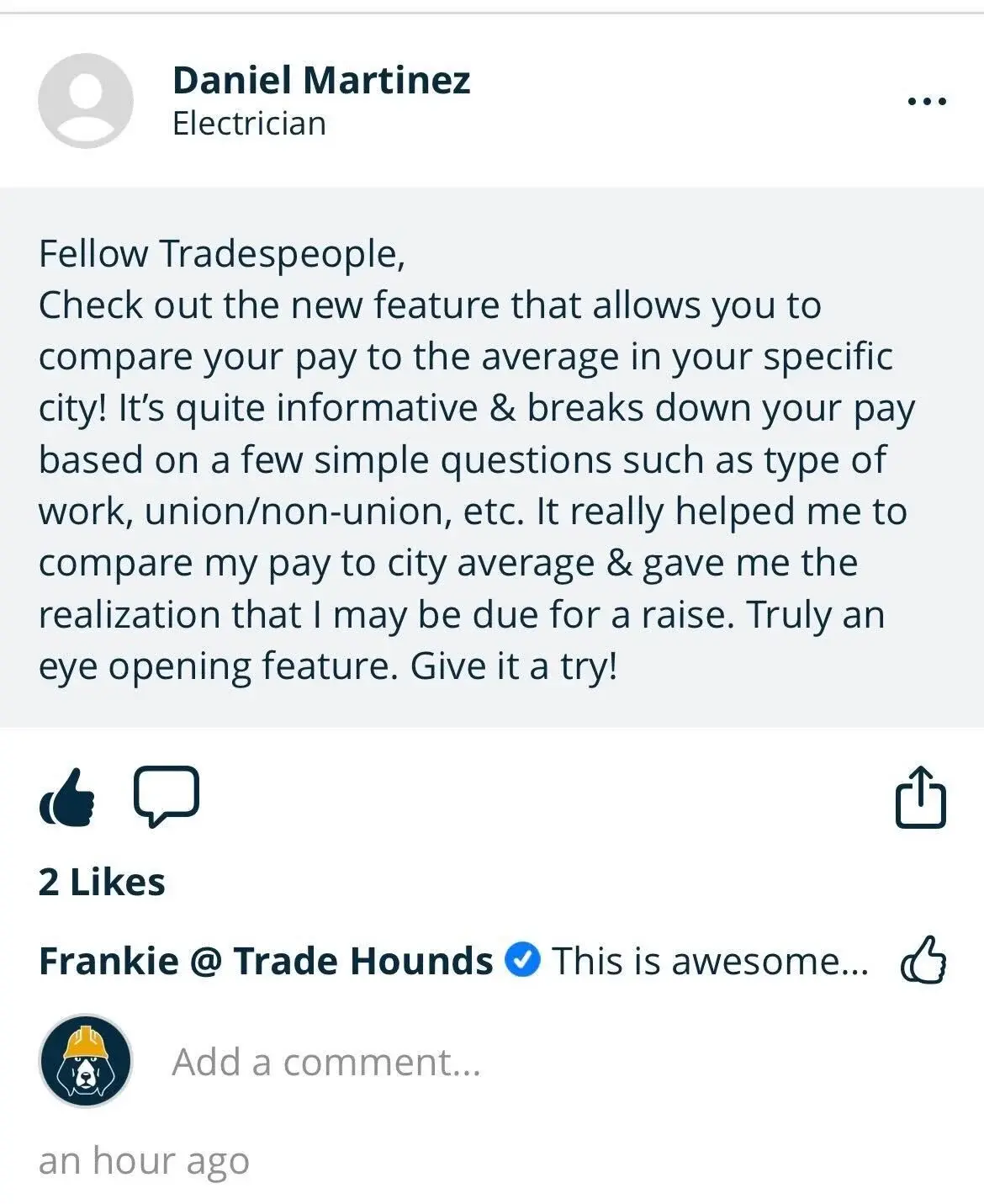How to Get a Raise in the Skilled Trades - in 7 Easy Steps!
As a skilled tradesperson, asking your boss for a higher wage isn’t always easy; it can be very intimidating and most tradespeople don’t know when, where, and how to ask. A few specific things MUST be done to maximize your chances of getting a big pay bump.
How do you negotiate a pay raise in construction?
First off - we know this is hard and many of you may have never asked for a raise before. We understand that. And yes, you deserve it.
But, you need to know that the people that ask are the ones that win - if you do it professionally and politely, of course. This is especially true if 1) you haven’t had a raise in 1-2 years and 2) company has been successful.
We wrote this for you because you should LOVE the trades, stop feeling burnt out, and worry less about your health. You should be happy to get up each day and pursue your craft and all you're doing to build this great country each day.
We know this stuff is hard to get your hands on and asking isn't easy. So, we compiled it all for you.
Follow these 7 steps to improve your chances of getting a raise:
- How to choose an appropriate time to ask
- Research salary trends
- Schedule a meeting
- Prepare what to say
- Treat the discussion seriously
- Be ready for questions
- Thank your manager
Step 1: How to choose an appropriate time to ask
Don't ask on a Monday! When asking for a raise, timing is important. Consider the following when you're preparing your request:
- The financial health of the company: You're more likely to get a raise if your company is doing well financially. You should look for signs of growth, such as more hires and clients. Check the news for stories about your employer or industry. Do company research and look at financial reports.
- Your manager's workload: If your manager is busy or focused on many things, you should wait for a different time to talk about a raise. Paying attention to your manager's moods and identifying how to help them demonstrates a level of maturity that will be useful in your conversation about compensation.
- The time of year: In construction, there are times when it is natural or convenient to talk about pay. Some employers may even conduct annual or quarterly employee reviews. If you have one coming up, your employer might already expect to discuss your compensation.
- Your recent achievements: Reflect on your recent accomplishments. If you recently reached an impressive milestone or exceeded an important goal, this could be a good time to ask for a raise. Document the details of the specific accomplishments you can reference in your conversation about a raise.
Step 2: Research salary trends
Next, you need to find out where your pay "ranks" relative to other tradespeople like you in your area. This information can be hard to find, but we've got you covered.
To do this, you can use the free Trade Hounds App's new “Compare Your Pay” feature to see if you’re underpaid - by comparing your trade, region, and experience level - all in one easy to understand view:
.webp)
.webp)
Click here to download the Trade Hounds App and anonymously enter your pay rate to see where your pay ranks for your trade, region, and experience level. Many Trade Hounds users have reported getting huge pay raises, including an HVAC Tech who got a +$7,000/year raise, an Excavator who got a +$2/hr bump, and a team of Heavy Equipment Operators who asked their boss for a raise - and got it:



Then, consider the following factors about yourself:
- Specialized skills
- Time with the company
- Greatest accomplishments
- Level of education
- Certifications
In addition to these factors, consider the cost of living adjustment. This is when employers adjust for things such as inflation or rising housing costs and give you a raise so you can maintain your current standard of living.
Step 3: Schedule a meeting
Rather than asking for a raise through an email, it's ideal to ask for a raise in person and in private. The best setting is a room with a closed door. Bringing it up on break with others around is not appropriate.
Before asking for a raise, reach out to your manager to see if they can meet to talk privately. It's good to let your manager know that you plan to discuss compensation in this meeting. If you have a performance review already scheduled, this could be a good time to discuss your raise.
Step 4: Prepare what to say
Before your meeting, you should prepare what you're going to say. Writing and practicing a script is one way to feel more confident about this meeting. Throughout your script, focus on the professional rather than the personal reasons why you deserve this raise.
Begin your conversation by clearly stating the purpose of the meeting. Here are a few examples of opening lines you could use:
- "Thank you for meeting with me today. Since I love working here, I want to take a moment to discuss my future with the company, mainly related to my compensation."
- "Thank you for taking the time to discuss my pay. After reflecting on my skill set, experience and accomplishments with this company, I have decided that it's an appropriate time to ask for a raise."
If your manager is open to the conversation from there, follow up with specifics. Tell them the increase or salary figure you'd like, use Trade Hounds to show them how you stack up compared to the market, and close with examples of your work that justify a raise. When you give an example of your work, include a metric that makes the value clear. Go into this conversation knowing that you deserve a raise, and communicate your confidence with strong words that leave little room for negotiation.
Step 5: Treat the discussion seriously
You should approach asking for a raise with the same level of seriousness you would have for a job interview or an important presentation, and you should act accordingly. Even if you work on the tools and most of your work clothes are damaged accordingly, consider dressing a little better for this meeting. Your appearance can convey to your manager that you understand the significance of the conversation.
Step 6: Be ready for questions
If you've asked for a raise at a good time and given evidence that you deserve to be paid more, you should expect your manager to give your request careful consideration. You can expect them to ask you follow-up questions, such as inquiring about the details of your recent accomplishments or the salary research you've done on Trade Hounds. You can also expect there to be some negotiation. Listen carefully to how your manager responds to your request.
If a raise doesn't seem possible at this time, you may consider asking about other elements of your compensation, such as allowances or vacation time. Learn why a raise isn't currently an option by asking them the following questions:
- "Are there skills or accomplishments you'd like to see from me before increasing my compensation?"
- "Are you satisfied with my performance overall?"
- "Is there a better time for us to have this conversation in the near future?"
This information can help you learn what you need to do to get a raise later on.
Step 7: Thank your manager
Regardless of how the conversation went, end the meeting by thanking your manager for their time. Send a follow-up message (text or email) that reviews your reasons for asking for a raise and includes a summary of the conversation you had.
If your manager needs to ask someone else about your raise, this message will make it easier to have a conversation on your behalf. If your manager rejects your request for a raise, this message can serve as a record of the conversation. You may decide to request a raise again at a later date, and you can reference the message at that point.
That's it!
We hope these steps were helpful for you! The Trade Hounds Team wishes you the best of luck in your raise negotiations and in the rest of your trades career.
Thank you so much for taking the time to read and for being incredible Trade Hounds App members.
---------
This article has been paraphrased from the following sources: